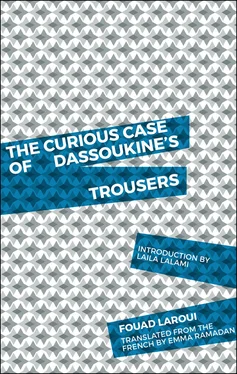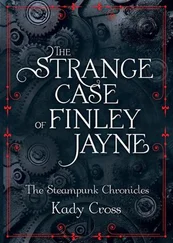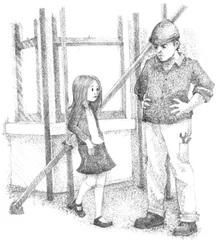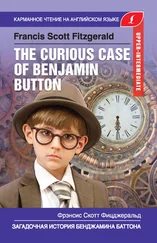“…the Count of Saint-Germain…”
“…a bionic spy…”
“I am filled to the brim with astonishment. I would even say: flabbergasted. The taxi drops me off in front of the barbershop. I enter, a bit worried, but there’s really no reason to be. The place resembles a hundred others, but the boss, the aforementioned Bouazza, doesn’t resemble anyone else. Bland, gray on gray, the mustache of a field mouse…He extends a floppy hand, I am his first client of the afternoon, he informs me, and points me toward the chair where I am to perch myself. A sweeping glimpse around: a few guys sitting in chairs but, visibly, they are not clients, but rather friends, neighbors, the curious. No apprentice in sight, no associate. This Bouazza seems to do everything in his den: shampooer, delouser, hairdresser for women, hairdresser for men, colorist if the occasion presents itself, perms for the Polynesian dentist’s wife washed up there no one knows how. Bouazza is a polyvalent figaro — as in, you ask him if he can do something, he responds: I can!”
“We all know someone like that.”
“The man of agile hands starts to do his work, his fingers ferret about in my hair, searching for the rebel cowlick, and I set about learning the central role he seems to play in the capital of bitumen. I don’t double cross him, I put all my cards on the table: I cut the deck with the governor, I declare Tijani, I lay down Kafouyi. He, the capillary artist, nods, ambling through my hair; doesn’t say a word but nods; and when I’ve finished, as the prose writer said, he remains silent for a moment, contemplating his oeuvre inversed in the mirror: he did a sort of monk tonsure that was very à la mode, àlamoude , he affirms — for example, from the times of cathedrals — then finally responds to the question I had asked him. Correct, he says, correct: all these characters are his clients.
“‘And it’s you,’ I dared, ‘who informs them of what goes on in their fair city?’”
“He wipes his hands on a rag dating from the year of the unicorn. The three or four bumpkins seated along the wall had not yet opened their mouths — like a brochette of half-wits waiting to be devoured by a giant. Then he gives a faint smile, like a grin putting on airs , and finally he murmurs:
“‘Me? But I know nothing of what goes on here… I never leave this shop, which I inherited from Mr. Ceccaldi, who was the hairdresser at the time of the French. I was his apprentice.’
“And then the brochette of half-wits starts up in unison:
“‘Bouazza never leaves this shop. He inherited it from Mr. Ceccaldi, who was the hairdresser at the time of the French. He was his apprentice.’
“My heart skips a beat out of fright, or perhaps from surprise. What is this cinema — or rather this ancient theater, with choir and coryphaeus? I get up, shove a few crumpled bills in the hand of the artisan, who verifies the amount with a glimpse of the eye— l’oeil du maître —then pockets them without saying a thing. I don’t know why, I feel a strong desire to slap him but I restrain myself, for these events are bigger than me and I find it all very tiresome. Well, it’s decided, I’ll leave this incomprehensible town — after all, my article is written. I start running, on the big avenue I stop an old Strindberg car, and I slump into a beat-up seat. The road that leads to Casablanca snakes around the plateau that shines with a thousand fires, etc. (I’ll describe it another time). I have a moment to think, between two deviations in the road. And it’s then that I understand .”
“You understand the deviations?”
“No. I understand this story of Bouazza the hairdresser, who calls to mind a cretin from the Atlas, who most certainly is a cretin, and a beautiful one, and yet, it’s in his den where conflicts are mitigated, it’s in this insignificant place, essentially empty…”
“That reminds me of the Tao: The spokes of the wheels converge at the hub. They converge toward the empty space. And it’s thanks to the empty space that the chariot advances. ”
“Oh yeah, yeah, there’s another: The vase is made of clay but it’s the empty space that makes it a vase. ”
“So, continuing on: It’s in this insignificant, essentially empty place that the way of the world is negotiated between the authorities, the futile people, Kafouyi, the businessmen, etc. War, devastation…”
“Again with the deviation.”
“No, I said: devastation, dev-uhhh-stay-shin. ”
“Apologies.”
“War, devastation, the struggle of everyone against one, or even everyone against everyone , all that is resolved at the barber’s. There, each person unloads, without giving the impression of doing so, his observations, his demands, his remonstrances, his conditions, his numbers, his statistics. The choir — these bumpkins who have nothing else to do between two harvests other than populate Bouazza’s cavern — the choir records it all and makes it into a refrain. The governor, the businessman, the trade unionist, the journalist take a seat in turn in the armchair, and at the end of the day, it creates a permanent negotiation. And it’s thus that we are a nation. Because we all accept this incessant palaver at Bouazza’s.”
“Isn’t it Renan who wrote something like ‘What is a nation? ’”
“We’ve had the answer for a long time. We are a nation because, despite our differences of opinion, we all find ourselves at Bouazza’s.”
“We are smarter than Renan.”
“On the other hand, he wouldn’t have given me a monk’s tonsure.”
“Certainly not…”
“…àlamoude.”
And on this lovely afternoon (“golden brown,” “glowing,” etc.); on this lovely afternoon when time seemed to stand still, as if awaiting its hour, when we claim the sun stops its trajectory (“have I really been following its course all this time?”) for a few moments, just before plunging behind its horizons (“bluish,” “distant,” etc. ), leaving man as an orphan of its light and uncertain of tomorrow; so, in this lovely Casablancan afternoon, in the middle of the crowd (“colorful,” “rushed”) invading the paths of the park, we looked at each other, moved; and in the same gesture, with the same energy, in this Café de l’Univers where, after our ramblings, we discovered certain laws (“the Laws of the Universe”), we raised our empty glasses to the memory of Ernest Renan and to that (future) one of Bouazza, to the longevity and vitality of our beautiful nation — and, above all, above all, to the empty space perfect in its milieu, the incredibly beautiful empty space that one sometimes has the desire to bow before and kiss on its hands — even the rain, even autumn, doesn’t have such delicate hands; the empty space so opportune, so violent and so efficacious, that it’s thanks to it, and only it, that the chariot (of the State) advances — that our cows are well guarded — and that our banner flaps in the wind, proud, haughty, and perfectly useless.
WHAT WAS NOT SAID IN BRUSSELS
“Brussels,” murmured John…
…and something in him whispered: “Funny place to meet up.” They were irritating, these set phrases that surged on the current of his thoughts. In this case, he knew where the expression came from. A film, of course. A French film, with Deneuve and Depardieu. But more often than not he didn’t know where these stray fragments came from, but they were there, suddenly, clearly stated, floating in the intimate monologue that accompanied John from morning till night, a wave of words he could only escape by closing his eyes and listening to a sonata (“Again with your Bach!” sighed Annie…). An article caught his attention in the Volkskrant he had just bought in the Amsterdam train station and was now reading while waiting on the platform for the Thalys departing for Brussels. Scientists had made “a giant step” in mindreading . More irritation. Why were they talking about progress (a step is progress, isn’t it?) when science made an advance — hmm, “an advance…”—when science made an incursion (an intrusion) in people’s heads? John tried to inculcate a sense of perspective in his students at the University of Amsterdam: yes, science is still the most precious thing man has (“And art, m’sieur?”—he had chosen to ignore, for once, Guusje and her little face riddled with freckles, eternally questioning everything…), yes, science, it’s what separates us from barbarism, but (he had raised an imperious finger) limits must be established!
Читать дальше












